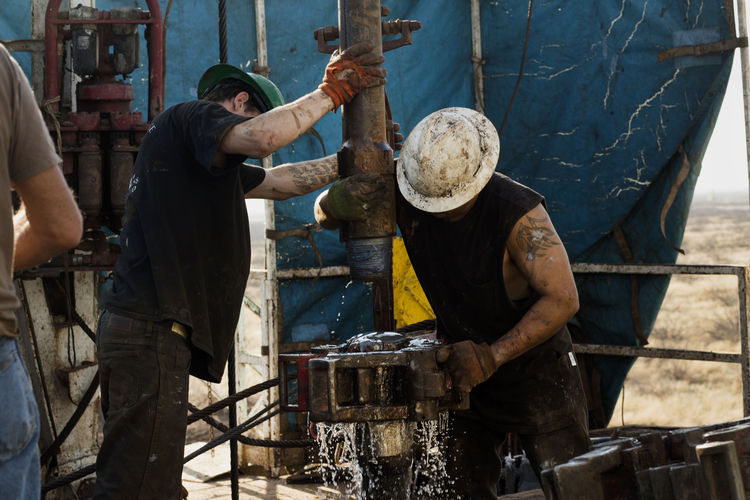- Nigeria Records Stable Oil Production Level of 2.3mbpd
The Group Managing Director of the Nigerian National Petroleum Corporation (NNPC), Dr. Maikanti Baru yesterday stated that the corporation as at June 2019 recorded 2.3 million barrels per day of crude oil production.
Baru also disclosed that the corporation attracted $3.6 billion and $3 billion in 2017 and 2018, respectively, adding that negotiations were currently ongoing to attract several billions of dollar worth of investments into the oil and gas sector.
He made the disclosure in Abuja while hosting the executive members of the Nigerian Union of Journalists (NUJ) led by its National President, Mr. Chris Isiguzo.
Baru, said: “We have been able to attract FDIs into the oil and gas industry and in 2017 alone we attracted about $3.6 billion; in 2018 we attracted about $3 billion. At the moment we are negotiating sums in the region of $7 billion as FDIs that will come into the oil and gas sector,” Baru said.
The GMD, NNPC, noted that since his coming into office in July 2016, “we are focused on increasing production of oil and gas and condensates. At some point, our national combined production of oil was about a million barrels. I am happy that at the end of 2018 we have moved on, averagely last year about 2.1 million barrels.”
“As I am speaking this morning, I look at our production figures, combine oil and condensates, we are pushing 2.3 million barrels per day. I think this stability and ability to push production has come as a consequence of several factors: our relationship internally, externally and of course with the media.”
“In the gas sector, we have a pushed at a lower level of about 450 million standard cubic feet per day to say that for the domestic alone, we are covering about 1.5billion cubic feet (bcf) that is 1,500 million standard cubic feet per day of gas.
“Internally, we have a flagship company, the Nigerian Petroleum Development Company (NPDC). This is 100 per cent NNPC operations; they have pushed their production and equity size from a lower figure of about 65,000 barrels per day in 2016 to over 166,000 per day equity. And overall production for NPDC, we are about to maintain it at close to 300,000 barrels per day. It’s quite a significant boost.”
“For NPDC, it has become the main supplier of gas to the power sector, supplying over 800 million standard cubic feet per day that is required to boost the production of power in this country. Currently the power that we enjoyed, as about 80 per cent input from gas driven tarmac power plant.
“In terms of products supply, which is really true, we knew the crisis we were in when we came in 2016. There’s a challenge; we have to put in a new scheme, which we properly called DSDP (Direct Sales Direct Purchase), essentially to directly sell crude oil and use the cash to directly purchase petroleum products.
While soliciting the firm soliciting the firm support and cooperation of the NUJ, the NNPC boss said the national oil company was working assiduously to meet the goals of the Economic Recovery and Growth Plan (ERGP), which is government’s policy vehicle to move to the economy to the next level.
“We will work hard to meet the ERGP goals. And we are focused on increasing oil and gas production and condensate.
“On the DSDP, approach to crude sales and products import, Nigeria saved N1.2 billion in one year using that template. Our transparency fetched us $.3.6 billion worth of foreign direct investment in 2017. In 2018, it was $3 billion, while in 2019, we have recorded $7 billion so far.”
While urging the media to help it in the fight against illegal refineries and products diversion, he said, “we have to remind the illegal refiners that they’re doing more harm. The crude is cooked poorly, spills in the waters, kills aqua life, causes acidic rain and impoverishes the people.
“It constitutes grave health hazard. Look at the spot all over Port Harcourt. It’s from the activities of the illegal refineries.
“We also have to warn the crooks involved in product diversion/smuggling to stop it because it’s bleeding our economy. “Some do it with 50-litre jerry cans via motorcycles. Within few shuttles, a truck is drained and these smugglers use the porous borders. Petrol is N390 per litre in Cameroon, in Chad it is N350/litre.”
Speaking further, Baru revealed that in Ghana, a litre of Nigerian oil is sold at N310.
“If 10 million litres is taken outside Nigeria, it is N2 billion that has bled out of our economy.
“These criminals and those colluding with them must be exposed. It’s not our job to secure borders but to ensure energy security, which we shall always do,” Baru stated.
Responding, Isiguzo said the visit was to congratulate Baru on the honour bestowed on him at the World Press Freedom Day Awards.
Isiguzo also urged the NNPC to look into the plight of host communities with a view to guaranteeing uninterrupted crude production.
He further appealed to security agencies and traditional rulers of host communities to protect oil installations in the interest of the country.

 Naira4 weeks ago
Naira4 weeks ago
 Naira4 weeks ago
Naira4 weeks ago


 Naira4 weeks ago
Naira4 weeks ago




 Naira3 weeks ago
Naira3 weeks ago
 Commodities4 weeks ago
Commodities4 weeks ago


 News4 weeks ago
News4 weeks ago


 Banking Sector4 weeks ago
Banking Sector4 weeks ago
 Travel4 weeks ago
Travel4 weeks ago


















